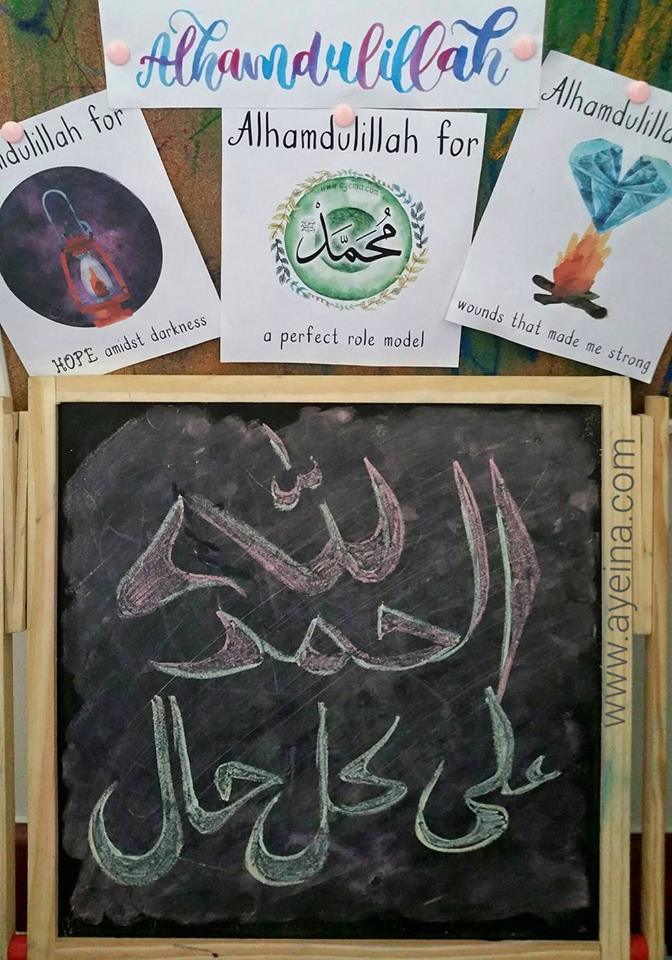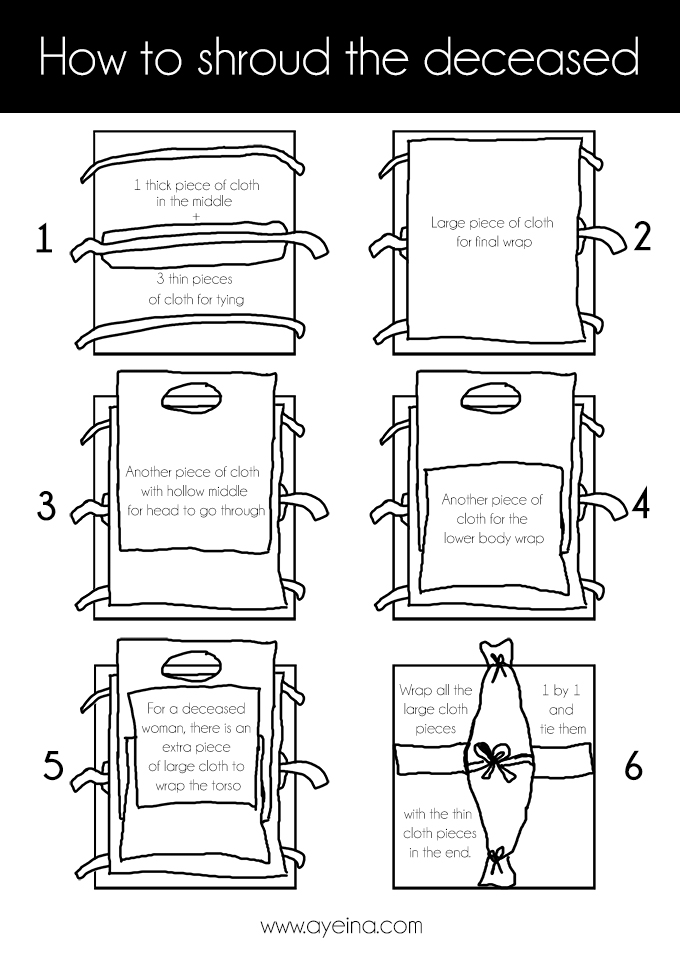READ: Advice from the Sunnah on Coping with Grief after the Loss of a Loved One
Having gone through this first hand – after my sister and my best friend (who’s also the co-founder of AYEINA) lost her son, it made me realize how important it is to know the formalities that come with the deceased. Especially a child. Because most people don’t know how the funeral of a child goes. They’ve mostly seen funerals of adults. And if you reach out, most people won’t have the knowledge of how a funeral is carried out. Especially when it comes to its practical application.
Although we read the topic of death in detail and even took its exams when we were doing our Qur’an course. But there we were, frantically going through the pages of the book (“mera jeena mera marna” – a book in Urdu) while trying to absorb the reality of death. We had forgotten some parts because we never got to apply the knowledge we were given. Even though it was a part of the course to practically teach the students all the funeral rites.
إِنَّا لِلَّهِ وَإِنَّا إِلَيْهِ رَاجِعُونَ
Go listen to the audio linked in the Arabic text above. “Indeed we belong to Allah , and indeed to Him we will return” rang true in so many ways. Because death – it waits for none. No matter how young, no matter how old.
It’s the worst nightmare for any parent out there but it’s a reality so many parents around the world go through. Parents in Syria, Palestine, Kashmir, Rohingya among many others, face such calamities every day. Some even multiple times a day.
It takes some time to swallow the bitter pill of reality – especially if the news come to you unexpectedly. Everything around you becomes so irrelevant and unimportant. The world starts to feel like an actual temporary place to live in. Something that we often forget amidst all the luxuries.
The term “what will the people say” become an extinct thought at that moment. You don’t care how you look like or the unanswered notifications adding up in your mobile. You don’t care about anything worldly at that moment.
And it’s that moment when you’re the most vulnerable and your tongue could say anything that Allah may dislike for you. Hence the first step after knowledge of such incident is:
1) Patience at first stroke of calamity
Accepting that death can come to anyone anytime is the first step towards being able to practice patience at the first blow of such calamity.
The Prophet (ﷺ) said, “The real patience is at the first stroke of a calamity.” [Bukhari]
Tears are a completely natural phenomenon in grief whereas crying out loud and wailing are contrary to patience and are not permissible.
2) Alhamdulillah ‘ala kulli haal
In that moment, you may hear people consoling you with all sorts of words. Some may say things that may be displeasing to Allah and staying grateful in all circumstances becomes harder that way.
Remember that the innocent souls of children will directly go to Jannah in shaa Allah – without any questions asked. That’s one part of satisfaction you have when you lose a child. You know that they are in better hands than yours. Better embrace than yours. Better care than you could provide. And definitely, a better place than this world has to offer.
I wrote on the topic of miscarriage beforehand as well after my sister went through that difficult phase. You can read it HERE:
Finding Hope in Miscarriage as a Muslim
After a week or so, I gave my sister the gratitude journal to fill in. Because the moments where gratitude seems the most difficult, are the moments that actually carry survival in gratitude. Without it, we’re surrounded by darkness over darkness. There seems no way out of the grief. Although she had been much stronger than all of us combined alhamdulillah, writing positive thoughts down out of an apparent negative scenario can be therapeutic…
3) Delegating tasks to different people
Preparing the body for burial is a Fard Kifaayah – A communal obligation on Muslims. You may be extremely clueless at what to do so it’s natural to ask someone to delegate tasks to other people because Prophet (ﷺ) said:
أَسْرِعُوا بِالْجَنَازَةِ
“Hasten at a funeral, for if (the dead person) is good, you would (soon) bring him close to the good. And if it is otherwise, it is an evil of which you are ridding yourselves”. [Muslim]
Hence you can ask your loved ones for things like:
1) informing close people around – those who can help and offer a warm shoulder.
2) closing eyes/mouth of the deceased.
3) taking the body to a place where one may need to give the ghusl and wrap in a shroud etc. – most probably your home (if you aren’t already there).
4) arranging the kafur (camphor)/lote-tree (sidr) leaves etc. for the ghusl.
5) bringing the kafan/shroud (burial sheets).
(we got our shroud pack from Alhuda)
6) sending a person to the graveyard so a child’s grave may be dug.
7) asking the mosque’s Imam nearby for the funeral prayer timings etc.
Although generally, the relatives of the deceased must hasten in paying back any debts from whatever wealth the deceased has left behind but of course, for a child – that’s not required.
4) Giving bath to the deceased
As a general rule, males should take the responsibility of washing males, and females should wash females. The only exception to this rule is in the case of husband and wife, or small children.
This and all the next steps are probably the scariest of all.
When you touch a body that has turned cold, it makes you realize the worth of a soul. The vessel that holds it turns into a scary reminder of death as you arrange a table to lay the body of the child on with your trembling hands and do ablution (wudu) to give the deceased a bath.
The procedure of ‘ghusl’ includes:
1) Removing the clothes (and cutting whatever clothing is difficult to remove) and keeping the body parts that are not being washed – covered with a towel/open cloth piece.
2) Applying slight pressure to the abdomen to expel any impurities.
3) Washing the private parts.
4) Washing the parts of the body that are washed in wudu.
5) Pouring water on right side of the body and then the left – 3, 5 or 7 times – first with sidr (lote-tree) leaves and the final washing should have some perfume in it, such as camphor or the like.
Narrated Um ‘Atiyya al-Ansariya: Allah’s Messenger (ﷺ) came to us when his daughter died and said, “Wash her thrice or five times or more, if you see it necessary, with water and Sidr and then apply camphor or some camphor at the end; and when you finish, notify me.” So when we finished it, we informed him and he gave us his waist-sheet and told us to shroud the dead body in it. [Bukhari]
6) Drying the body/Clipping the nails/combing the hair etc. to get the body ready for shrouding.
5) Shrouding the dead body
Nothing reminds you of hereafter more than this step.
The Prophet (ﷺ) was shrouded in three sheets. The preferable color of the shroud is white.
Messenger of Allah (ﷺ) said, ‘Wear white clothes because they are the purest and they are closest to modesty; and shroud the dead in it.” [Riyad as-Salihin]
It is not permissible to be extravagant in shrouding the dead. The sheets should be ordinary cloth, and the number of sheets should not exceed three. It is recommended that the shroud is perfumed with incense, except in the case of a person who died in a state of ihram.
How to wrap a body is the most confusing part – mostly because your brain is really not present there and you feel that your limbs are simply doing what they’re supposed to do at the given moment. Your mind is somewhere else – away from this dunya.
I’ve illustrated the following on my own with the help of the illustration in the book “mera jeena mera marna” and translated it into English – Please feel free to print it out. Hope it helps.
6) Offering the Funeral prayer
The shrouded body is then taken for Salaat-ul Janaazah which is a communal obligation – Fard Kifaayah.
Hence one can inform all those who can attend the funeral. Relatives living in the same city, neighbors etc. It also gives you a sense of community alhamdulillah. How people gather when you need to hold the warm hands the most.
This is the moment when reality actually hits you and if you haven’t shed tears all this time, the funeral prayer leaves your vulnerability wide open.
The funeral prayer is in the form of a congregation. The Imam stands facing the Qiblah behind the head of the deceased man and behind the middle of the deceased woman.
Steps of the funeral prayer:
1) After the first takbir, Surat al-Fatihah is recited silently. It is also permissible to recite another small chapter after it (if the time allows).
2) After the second takbir, the prayer for the Prophet (s.a.w) should be made.
3) After each of the remaining two or more takbirs, sincere prayers (du’a) are made for the deceased and their relatives. There are different invocations in sunnah but the easiest of all (something that you can memorize right away) is:
أَللَّهُمَّ أَعِذْهُ مِنْ عَذَابِ الْقَبْرِ
Allahumma a’idhhu min ‘adhab al-qabr – (O Allah, protect him from the torment of the grave).
4) After the final takbir comes the tasleem – giving greetings of salaam, as one does in regular prayer (salaat) to conclude their prayer. One may do so by making tasleem to both the right and left sides, or the right side only.
7) Burying the deceased
If you’re a woman, you may not get to see the deceased being buried six feet underground so funeral prayer may feel like a final goodbye.
But please make sure that you inform those who are burying the child (or even an adult) that the grave is not elevated or decorated with etched tombstones etc. What the deceased benefits from, are your duas.
Jabir said that he was forbidden to plaster graves. [Muslim]
The Messenger of Allah (ﷺ) forbade writing anything on graves. [Ibn Majah]
8) Eating Tharid / Talbina
Most cultures around the world don’t have such customs hence no one may send you the dish.
‘A’isha the wife of Allah’s Apostle (ﷺ) said: When there was any bereavement in her family the women gathered there for condolence and they departed except the members of the family and some selected persons. She asked to prepare talbina in a small cauldron and it was cooked and then tharid was prepared and it was poured over talbina, then she said: Eat it, for I heard Allah’s Messenger (may peace be upon him) as saying: Talbina gives comfort to the aggrieved heart and it lessens the grief. [Muslim]
I personally made it myself the next day. I followed THIS RECIPE for Tharid (although I didn’t add all the garam masala etc. – kept it as simple and digestible as possible). You can follow THIS RECIPE for Talbina.
9) Mourning (not wearing perfume etc.) for 3 days only
The Islamic term for mourning is Hidaad. Mourning for more than three days is not permitted except in the case of a woman whose husband has passed away (iddah of 4 months and 10days).
I love how Allah allowed the natural feeling of grief, but didn’t let us wallow in it so much that we forget to do anything for the deceased or ourselves.
The Messenger of Allah (ﷺ) said, “Two matters are signs of disbelief on the part of those who indulge in them: Defaming and speaking evil of a person’s lineage, and wailing over the dead.” [Muslim]
Although memories never die, but each memory is a constant reminder that you have to strive harder and better. If your child is in Jannah bi’idhnillah, then you need to do more and more and more to be able to meet him one day…The yearning to hold him in your arms once again keeps you pushing forward.
Grief and weeping for the dead is allowed in Islam and a completely natural phenomena. But it is prohibited to express grief by wailing (mourning in a loud voice), shrieking, beating the chest and cheeks, tearing hair or clothes, breaking things or scratching faces or saying phrases that makes a Muslim lose faith.
May Allah help us all enter Jannah with easy reckoning so we may all unite with our loved ones that we dearly miss in this world.
“The grief may never go away. The void may never fill again. But we need to take care of ourselves beyond 3 days. Allah gives us the chance to pick ourselves back up again. Out of everyone else, us mothers need to take care of ourselves the most in this difficult time. I’ve been there. The wounds still feel fresh sometimes. When Allah says mourning is for 3 days, it means how one can let go of themselves in that time in terms of self-care – for eg: One doesn’t apply perfume etc. But feeling sorrow has no timeline. Though I hope that our hearts are filled with hope even when the sadness doesn’t seem to leave and the tears never cease to flow. May our tongues never say anything that displeases Allah even when the soul feels wounded and hurt. It’s not easy. But I know that Allah wouldn’t have let us go through something like this if He didn’t consider us strong enough! May we meet our beloved children in Jannah!” – (Ayesha)
NEXT PART: How to Introduce a Concept of Death To a Muslim Child










Its very informative and tugs a chord of ones heart! I hugged my toddlers and imagined how painful it must have been for the mother to lose her baby! Yet many mothers go through this!
Jazakillah for sharing! The selfish me never want to need this piece :/
Our children are Allah’s amaanah and I wish we could see that often because we treat them like we own them at times…
Yes, we should hug them a little more, a little tighter and a little warmer…
Reminders like these help us realise how temporary it all is…
As-salamu Alaykum, Dear Sisters,
To Allah we belong and to Allah we return. So, so sorry to read of your loss. It is incredibly generous of you to share this knowledge with others who may need it during the most difficult trial of their lives. Thank you so much for everything you do, and for the value that your site gives to your readers.
Walaikum assalam Amel. Jazakillah khairan katheera for your kind words and du’as. They mean a lot ❤
I’m so sorry for your and your sisters loss.
Thanks for sharing this is very informative and easy to read , funerals are very hard emotionally on some people, I had a really hard time when my best friend passed away and I didn’t know where I was suppose to go or how to do the washing so I just started calling people in the Muslim community until I got the needed help
May Allah grant your friend jannah tul firdaus and unite you with her one fine day bi’idhnillah 💜
Even people with knowledge can be as confused in that situation as anyone else. Death is a difficult pill to swallow…
I’m 2 weeks away from my due date and reading about this hits me with the truth of reality and life. At the same time, my heart beating harder than usual, steadily… feeling scared. It’s as if the “out of this Dunya” feeling, that which you are talking about, is there already. Very informative and a good article to even have printed or kept somewhere.
Have good hopes from Allah ❤ may Allah make it easy for you and grant you coolness of eyes in your children 😍
First accept my condolences….I know how difficult it is to write up this post….Allah SWT bless you all with Sabar….It is very useful post for many….
Aameen. Jazakillah khairan katheera ❤
Ameen.
JazakAllah Khair for this informative post at such a hard time. My love and duas are with you both as always.
My sister miscarried twice and we lost my brother in his twenties…but I have never really learnt the funeral procedures as all this happened when I was in my early teens. Seeing the body of my brother had such a negative effect on me that I actually now try to avoid seeing the person who has passed away at funerals…it may be wrong to do that but it is for my own state of mind.
Death of loved ones can leave long lasting effects at times and if painful wounds are cut open due to a certain scenario, it’s best to avoid indeed.
May Allah grant your brother forgiveness and jannah tul firdaus ❤
I can hardly function after reading this. The reality of our morality is scary. May Allah bless us all
It’s scary but it’s a great reminder that we all shall return to HIM one day.
Inna lillahi wa inna ilaihi raji’oon. My heart goes out to every mother that lost a child. Writing something so detailed at a time like this must have been uneasy. I appreciate it.
My first time praying in the funeral prayer was in the haram and i have been unable to memorize the long du’a i found…so jazakillahu khayr 😊.
Although it’s mainly used for kids but sometimes there’s not much time between takbeeraat so this is conveniently recited alhamdulillah.
Extremely sorry to hear about the loss. May Allah bless your sister and the entire family with patience. This was a very informative piece. Thank you for gathering all the information and adding it to my knowledge.
Aameen. Jazakillah khair ❤
Aslam Alaikum sister ayeina, my sister(cousin but she is super close) had a baby the 28th of September alhamdullilah(praise Allah) but he was very sick they took a lot of tests and they found out he had some genetic mistake in his body the doctors said, and made the mother cry out every time he was in pain. He passed away 2 days ago. I’m wondering how do I support her and what is the consoling things to say? He was constantly in pain when he was in this Duniya so I’m grateful to Allah azzawajal to free him of that and I will fight and do my best to meet him again in Jannah. But will this really give her any hope does this really strengthen her iman?
SubhanAllah this is such a reminder of how fleeting life is and how our children are not ours but simply an amanah from Allah given to us for a short time.
My duaas are with Ayesha and you all through this difficult difficult time ❤️
True. We think we own our kids and hence treat them that way. If only we consider them an amaanah of Allah, we’ll probably be more patient with them like we are with kids who are not ours…
Ma Sha Allah. May Allah bless you endlessly for this educative and informative post.
Sis maa shaa Allah I can imagine how hard it was for you to write this, but I honestly think it was such a great and genuine thing to do. I have never been to an Islamic funeral and have no idea how any of that works so it was helpful and informative for me. I also loved how it wasn’t just all inforamtion but you added important reminders about death and duniya. You and Ayesha and family are in my duas.
Jazakillah khair. Most of us have not attended the funerals or seen everything that death entails. We had not experienced it before this one either…
You discussed a very important topic in simplest way. Great post!
I have delayed reading this for so long. This is something we all don’t want to think about until it happens to us. My heart goes out to you and family. May we all be reunited with our loved ones in jannah. Ameen
Salaam. When my 5 month old nephew died we were almost discouraged from reading the quraan, yaaseens and thikr as pure little innocent souls don’t need help finding their way to Jannah (as you mentioned). However, i found that it is more a comfort for the readers than a gift to the departed. I read over the words Salaam-un qawlam mirrabirraheem in Surah Yaaseen (which roughly translates to “Peace, a word from the Merciful Lord”) which is how the angels will greet all the purest souls who enter heaven. It provided me with more comfort than any of the words of consolation people had for me. So i would advise people to do the same. For contentment of one’s own heart.
It is INDEED more of a comfort for the readers than a gift to the departed. Beautifully put! The deceased can only take what’s his/hers to take from this world – which is – their good deeds, duas and sadaqah jaariyah they did in the world that continues even after their demise (be it in terms of money or knowledge etc.).
It’s the hope of meeting loved ones in jannah that keeps us motivated and strong in such hard times…
Asslaamu Alaikum Varahmatullahi Vabarakatahu, With Allah blessing we had a boy child on march 9 2018, but due to some issue he came out by operating before 45 days. Since he have some problem he was kept in a incubator for around 5 days, i said athan and iqamath and named him as Umar. But he passed away in 5 days i mean by march 14. I failed to do sunnath to him. is it a sin. Also make dua for us, so that Allah may bless us with another child. Inshallah
(O Allah), Guide us to the straight path; The path of those whom you have favored; Not those with whom you are angry; Nor those who go astray.
I feel your pain sister Haffila as my only son was put in an incubator too due to breathing problems and due to covid i was not allowed to touch him. But i would be there with him for hours on end talking to him and seeing him open his eyes the only time they allowed me to hold him was when he was dying and alhamdolah even though it ripped my heart atleast i held him close and did chahada when he was taking his last breaths in my hands. Sister i know your message is old and i hope to know that you have at least one child if not many and if you do not yet have any i pray for allah to grant you with as many children as you please. My heart and prayers are with you and all other mothers feeling the pain im feeling right now.
Really sorry for your loss.. subhan Allah you’ve shown immense courage and at the same time helped many broken hearts to heal and strengthen their faith with your beautiful lines.may Allah make us his righteous slaves and give us the ability to accept his decree..
i dont agree at all with the statement of mourning 3 days
if you really research islam thoroughly you will notice that prophets did not cry one or two days they cried for a very long time!!!
There is no time frame to mourn the death of your baby!!
The grief may never go away. The void may never fill again. But we need to take care of ourselves beyond 3 days. Allah gives us the chance to pick ourselves back up again. Out of everyone else, us mothers need to take care of ourselves the most in this difficult time. I’ve been there. The wounds still feel fresh sometimes. When Allah says mourning is for 3 days, it means how one can let go of themselves in that time in terms of self-care – for eg: One doesn’t apply perfume etc. But feeling sorrow has no timeline. Though I hope that our hearts are filled with hope even when the sadness doesn’t seem to leave and the tears never cease to flow. May our tongues never say anything that displeases Allah even when the soul feels wounded and hurt. Sending warm hugs to you Anisah. It’s not easy. But I know that Allah wouldn’t have let us go through something like this if He didn’t consider us strong enough! May we meet our beloved children in jannah! <3
Salam
Jazakillahu Khairan for this post.
I lost my 3rd daughter I had only 2 weeks till my due date.
Her name was Asiya
I just want to know what is there I can do for her like send sawab or how to remember her every Friday?
Walaikum assalam. Inna lillahi wa inna ilaeehi raa ji oon. May Allah replace your loss with a highest place in Jannah where the immense joy in the presence of your lost loved ones will replace all the loss felt in dunya. She was an innocent soul and as per hadith, all babies go to Jannah (under the care of Ibrahim alayhis salam) so she does not need sawab. We as adults do to make sure we reach that place where our loved ones already will be in shaa Allah. What you increase in your good deeds will help you step a little closer to Jannah with each step bi’idhnillah. May Allah heal your pain sis! It’s a tough time for mothers. If the emotions overwhelm you, there’s no shame in seeking grief counselling.
I just lost my infant son 2 days ago. He only lived for 27 days but the love for him was unconditional it breaks my heart as I still have all the scars and bruises and my breasts are still leaking but my only son is gona rahimaho allah. However no one is letting me cry as they are telling me I am burning him with every tear that falls down my face for him and that he will hate me for that is this true?
Oh sis it must be more heartbreaking to hear such statements from others while going through the loss too. It is REALLY hard to go through this trial – especially as a mother who bore the child for 9 months and delivered him into this world with great hardship that no one else went through except for her. The only thing Allah asks of us is to not utter the words that may be displeasing to Him (for eg: “why would Allah do that to me. It’s not fair.” or “if only I would have done so and so, then he would have been alive” – just generic examples). But you have every right to shed tears. Like Muhammad ﷺ did. As mentioned in Sahih Bukhari 1303, He said (about his tears), “O Ibn `Auf, this is mercy.” Then he wept more and said, “The eyes are shedding tears and the heart is grieved, and we will not say except what pleases our Lord, O Ibrahim ! Indeed we are grieved by your separation.” – Having said that, I hope this article helps you: https://ayeina.com/advice-from-sunnah-on-coping-with-grief/ (May Allah reward you for your patience in this loss in this dunya and aakhirah both). And remember that you can shed tears even while you’re patient. They aren’t contradictory to each other.
Thank you sister Samina this means so much to be especially having buried him only today as his paperwork and permission were given to us today. I still dont want to see people as they all come over and say the same thing im currently in my room writing this reply with a living room filled with people saying i shouldnt cry they dont understand that even through he did not live long i love him with all my hear rahimaho allah. They are telling me that i can have more children but its not the same i know i shouldnt be writing this here but its the only place i found to express myself without being told not too. Your reply has brought me some peace in knowing that im not hurting my baby with my tears as they wont stop no matter how hard i try and how many duas and Quran i recite. Thank you sister.
Ma Sha Allah. May Allah bless you endlessly for this educative and informative post. Thanks a lot.
May Allah bless and protect us
Aameen
May Allah bless and w